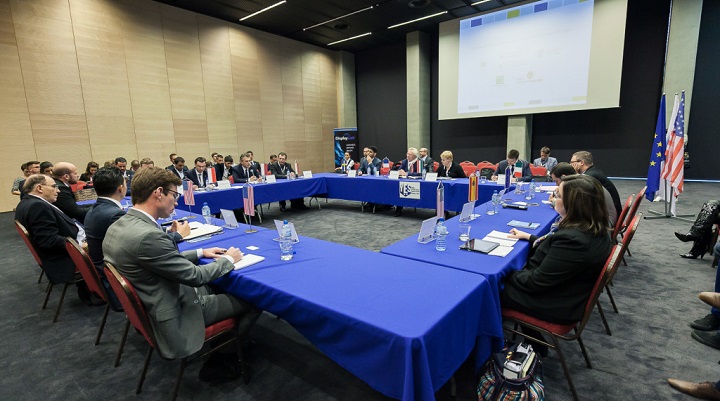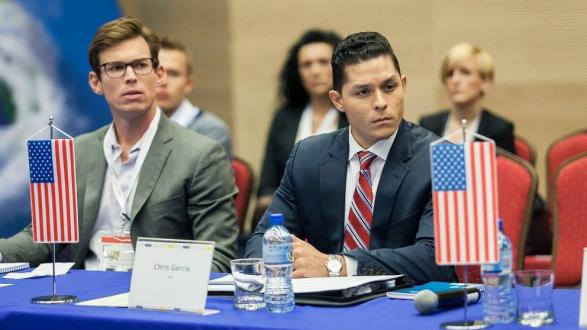In:
Get used to hearing about the Transatlantic Trade and Investment Partnership (TTIP).
The proposed trade agreement, currently the subject of negotiations between the United States and European Union, aims to create the world’s largest free trade zone in the North Atlantic. Negotiators hope that the removal of trade barriers will boost investment in the economies of both regions. But how will the Partnership impact the role of young entrepreneurs and the growth of small-to-medium sized enterprises (SMEs), which account for more than 99% of all businesses in both the United States and European Union?
We spoke to Chris Garcia, an American entrepreneur and political advisor, about his work with several other Pacific Council members during an October 2015 discussion on the TTIP negotiations, held in Katowice, Poland. Together with representatives from the European Confederation of Young Entrepreneurs (YES for Europe), Garcia and his fellow Pacific Council members released a joint communiqué calling on TTIP negotiators to recognize the role of youth entrepreneurship in generating growth, innovation, and job creation.
A lightly-edited transcript of our conversation follows.
____________________
Pacific Council: On February 22, the opening day of the 12th TTIP Negotiations Round in Brussels, you along with several other Pacific Council members and entrepreneurs released a joint communiqué with YES for Europe calling for a set of policy recommendations related to the trade agreement. Can you describe those recommendations and why they are important?
Chris Garcia: In October of 2015, the former Undersecretary of State of Poland and current Chairman of the Chamber of Commerce and Industry in Katowice, Tadeusz Donocik, invited me to represent young American entrepreneurs during the EU-U.S. Young Entrepreneurs Summit at the European Congress of Small and Medium-Size Enterprises in Katowice. During the summit, EU and U.S. entrepreneurs voiced concerns over TTIP and the decision was made to communicate a set of recommendations to U.S. and EU policy makers.
Our recommendations are fairly straightforward: TTIP must benefit entrepreneurs and small-to-medium sized enterprises (SMEs), not just multinationals and large corporations.
We address both the negotiation process and the proposed final TTIP provisions:
- Support an entrepreneurial culture and benefit young entrepreneurs and small businesses;
- Promote transparency and build awareness of TTIP;
- Unleash the potential of e-commerce and digital technologies, while protecting intellectual property rights;
- Increase access to, and transparency in, the public procurement process for entrepreneurs and SMEs;
- Develop and encourage Transatlantic-specific joint programs to help grow early-stage businesses such as incubators, accelerators, early-stage financing and micro-grants, as well as early stage programs that encourage minority and women entrepreneurs and social enterprises;
- Create a U.S.-EU-wide entrepreneur visa program and entrepreneur exchange program; and
- Adopt U.S.-EU-wide taxation and funding policies that ease entrepreneurs' and SMEs' access to alternative investment capital, and encourage the participation of angel investment, venture capital, and private equity on both sides of the Atlantic.
PC: What impact do you hope the joint communiqué will have in future negotiations?
Chris Garcia: Entrepreneurs and SMEs are the lifeblood of any nation's economy. As such, it is important for policymakers to understand how TTIP will affect the entrepreneurs and small businesses that drive our economic engine. For the United States, this means communicating directly with the U.S. Trade Representative's Office - as well as members of the U.S. House and Senate - about the recommendations that should be included in the final TTIP language.

Our most popular recommendation is the creation of a U.S.-EU entrepreneur visa program and a U.S.-EU entrepreneur exchange program. We envision such programs providing a platform for the exchange of ideas and best practices, while lowering the barriers to entrepreneurs' mobility. Finally, while the majority of entrepreneurs and SMEs are in favor of more free trade, we also want to see smart trade. We hope that our joint communiqué asserts these key points to U.S. and EU negotiators.
PC: The communiqué states that participants are “at the authorities’ disposal to offer insights, expectations and suggestions” as negotiations progress. Is there a plan to ensure that the recommendations remain relevant going forward?
Chris Garcia: We're fortunate to have an excellent group of Pacific Council participants from various backgrounds, who are able to offer their expertise to U.S. and EU authorities.
Mr. Stephen Cheung, President of the World Trade Center Los Angeles, lends his expertise in foreign direct investment and international trade. Mr. Chris Lawson, an executive at the Creative Artists Agency, offers his expertise in the entertainment industry and the necessary protection of intellectual property rights. Ms. Candace Chen, Founder of Face Lube for Men, offers her expertise concerning the consumer products industry, and Mr. John Nahas, Managing Partner of Engeocom-Invicta Trading, brings his expertise in the commodities arena.
Our plan is to remain in constant contact with the U.S. Trade Representative's Office and Congress throughout the discussions to ensure that entrepreneurs and SMEs are fairly and equitably represented.
On the other side of the Atlantic, our European counterparts at YES for Europe - President Luca Donelli, Vice President Przemysław Grzywa, and Immediate Past President Dimitris Tsigos - each lend their expertise as entrepreneurs and leaders in the youth entrepreneurship ecosystem. They are in contact with authorities at the European Commission to ensure our recommendations are heard.
PC: Can you explain the role of youth entrepreneurship in generating growth, innovation, and job creation?
Chris Garcia: Programs that support youth entrepreneurship create pipelines that feed opportunities to innovate, create jobs, and grow our economy. This is vital: recent numbers show that entrepreneurs and small businesses generate over 50 percent of our nation's GDP, and create 74 percent of new jobs. Because young entrepreneurs are the future drivers of a significant portion of our economy, it is critical that we equip them with the training, resources, and opportunities they need to be successful.
I recall a State Department trip to Athens in 2014, where we met with Greek officials and entrepreneurs at the height of Greece's recession. We're talking 26 percent overall unemployment, 52 percent youth unemployment, and a full 25 percent decline in GDP from the previous year. Many of us recall the riots and protests, but almost unnoticed was the number of unemployed young Greeks who decided to take control of their situation and start their own ventures. If more young Greeks understood the possibilities available through entrepreneurship, they'd innovate themselves out of the economic downturn.
Because young entrepreneurs are the future drivers of a significant portion of our economy, it is critical that we equip them with the training, resources, and opportunities they need to be successful.
Here in the United States, our youth have some of the brightest minds in history. We rely on our youth to create the next generation in technology, entertainment, medicine, and much more. They challenge the status quo, and look for ways to improve upon antiquated ideas. Look no further than Silicon Valley in San Francisco and Silicon Beach in Los Angeles: youth entrepreneurship has effectively "grown the pie," so to speak.
TTIP must absolutely benefit entrepreneurs and small businesses here at home and across the Atlantic if we hope to see continued growth in innovation, high-paying jobs, and the quality of life for US and EU citizens.
____________________
Chris Garcia is an American entrepreneur and political advisor based in Los Angeles, California. Follow him on Twitter: @ChrisGarciaUSA




